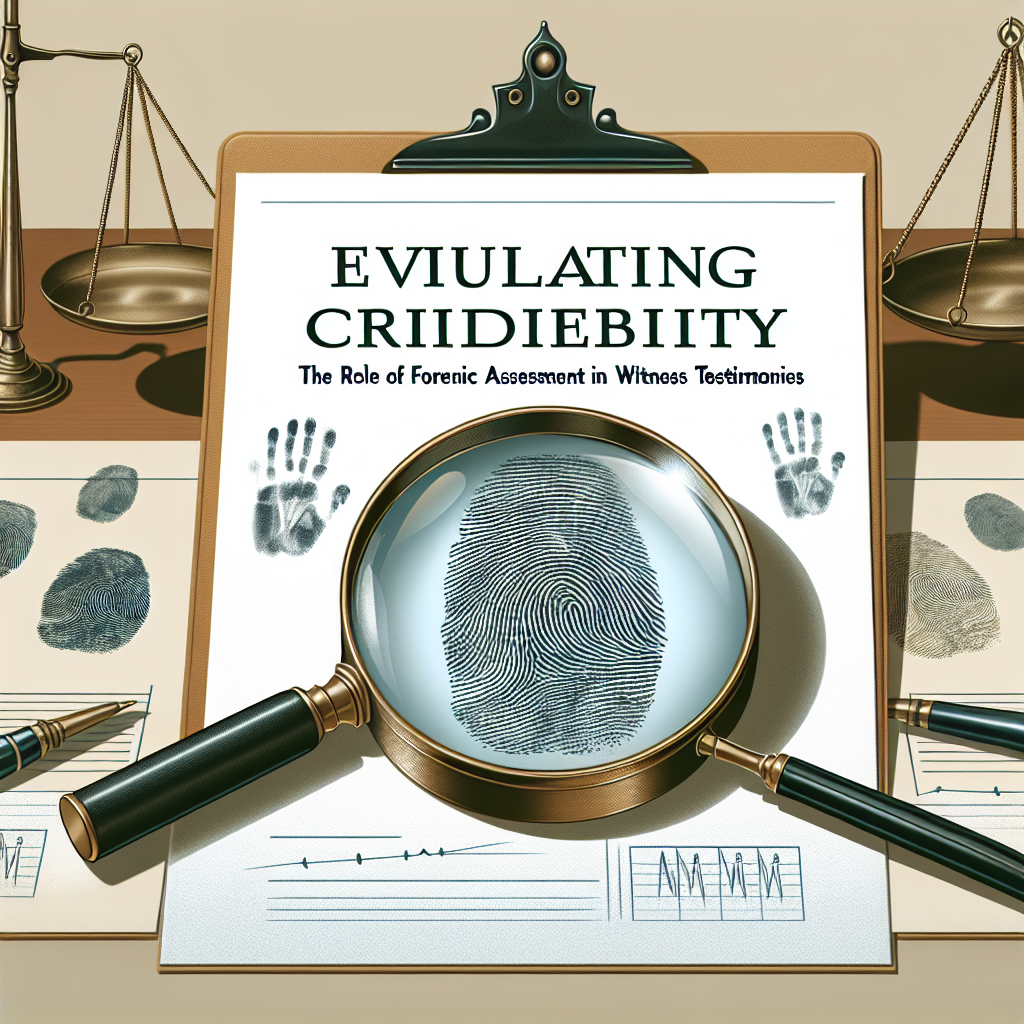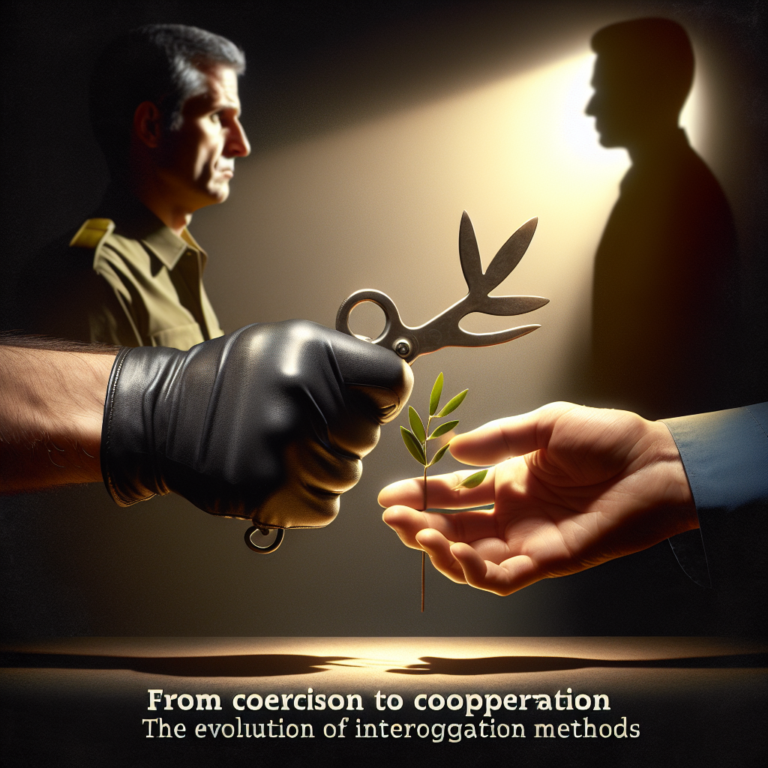
Introduction
In the realm of legal proceedings, the weight of a single testimony can tip the scales of justice. Evaluating credibility: The role of forensic assessment in witness testimonies is not just a technical process; it is an essential cornerstone that can determine the outcome of cases ranging from minor infractions to major criminal offenses. With the stakes involved—where lives can hang in the balance—understanding how forensic assessments work to evaluate the credibility of witnesses is not merely academic; it is profoundly impactful.
The reliance on witness testimonies stems from their human aspect, bridging evidence to emotional truth. However, human memory and perception can be remarkably fallible. This article delves into the critical methodologies used for assessing credibility in witness testimonies, the challenges faced within the judicial system, and the concrete steps that can be adopted to enhance reliability.
The Foundations of Credibility
What is Credibility?
At its core, credibility refers to the trustworthiness and reliability of a witness’s testimony. A credible witness is one whose statements are seen as likely to reflect the truth. Factors that influence this credibility include:
- Consistency: Recurring themes or details in the statements made over time.
- Coherence: How logical and understandable the testimony is, considering the context.
- Confidence: The level of assurance presented by the witness during their account.
Evaluating credibility: the role of forensic assessment in witness testimonies hinges on these factors, coupled with scientific methods, to provide a more robust framework for evaluation.
The Role of Forensic Assessment
Forensic Psychological Evaluation
Forensic psychological evaluations play a pivotal role in assessing the credibility of witness testimonies. Through structured interviews, cognitive assessments, and observational techniques, forensic psychologists can evaluate various aspects, including:
- Mental Health Status: Evaluating any psychological conditions that may affect memory or perception.
- Malingering Assessments: Identifying instances where a witness might exaggerate or fabricate experiences for personal gain.
For example, a notable case involved a witness who later was revealed to have a history of severe psychological trauma. The forensic assessment conducted took this background into account, leading to a reevaluation of their testimony’s reliability.
Challenges in Evaluating Credibility
Memory Fallibility
One of the inherent challenges in evaluating credibility is the fallibility of memory. Research shows that human memory is not a perfect recording but is susceptible to distortion over time. This phenomenon can result in:
- False Memories: Details that the witness believes to be true but are not accurate.
- Confabulation: The unintentional filling in of gaps in memory.
To counter these challenges, forensic assessments often employ techniques such as cognitive interviewing, which aims to improve the clarity and accuracy of witness recall.
Case Studies: Real-World Applications
Case Study 1: The Central Park Five
In the infamous case of the Central Park Five, the testimonies from multiple witnesses played a critical role in convicting five innocent teenagers. Forensic assessments later revealed that coercive interrogation techniques had led to unreliable accounts, highlighting the dire consequences of neglecting the principles of credibility evaluation in forensic settings.
Analysis: This case illustrates the paramount importance of integrating forensic psychological evaluations to identify potential biases and discrepancies in witness testimonies.
Case Study 2: The Trial of Amanda Knox
Amanda Knox’s trial presented another significant example where witness credibility came under scrutiny. Forensic experts analyzed the testimonies of various witnesses, revealing inconsistencies and biases that influenced the jury.
Analysis: Here, the systematic evaluation of witness testimonies using forensic assessments proved essential in understanding how perceptions and societal pressures can distort truth.
Techniques for Evaluating Credibility
Use of Forensic Assessment Tools
Several standardized tools and methods help assess the credibility of witnesses, including:
- Structured Clinical Interviews: These allow for a uniform approach to gather data, making the analysis more reliable.
- Psychometric Testing: These assessments help gauge cognitive functioning and memory recall abilities.
Integrating these tools contributes immensely to evaluating credibility: the role of forensic assessment in witness testimonies, providing a scientifically grounded basis for claims made in court.
The Impact of Technological Advancements
Digital Forensics
As technology advances, so does the breadth of forensic assessment. Digital forensics encompasses tools that can analyze emails, social media exchanges, and even digital footprints, providing context that further supports or undermines witness accounts.
In 2019, digital forensic evidence played a key role in the conviction of a defendant by corroborating witness testimonies and verifying timelines.
Conclusion
Evaluating credibility: the role of forensic assessment in witness testimonies is an evolving field that stands at the intersection of psychology and law, crucial for ensuring justice in the courtroom. Bridging scientific methodology with human understanding, it seeks to minimize biases and enhance the truthfulness of testimonies.
As we navigate an increasingly complex legal landscape, prioritizing forensic assessments will not only enhance the reliability of witness accounts but also contribute to more just outcomes. Indeed, the future of witnessing depends on how effectively we apply these principles, transforming the narrative from mere testimony to credible evidence.
FAQs
1. What is the primary goal of forensic assessment in witness testimonies?
The primary goal is to evaluate the credibility and reliability of witness accounts to ensure accurate representation of facts in a legal setting.
2. How does memory affect witness credibility?
Memory can distort and influence how events are recalled, potentially leading to inaccuracies in witness statements, which forensic assessments aim to clarify.
3. What role do psychological evaluations play?
Psychological evaluations assess the mental health of witnesses and their potential impact on memory and perception, thereby informed interpretations of their testimonies.
4. Can forensic assessments detect lies?
While forensic assessments can identify inconsistencies and biases in statements, they cannot definitively prove whether a witness is lying; they merely evaluate credibility.
5. How can legal professionals improve testimony reliability?
Legal professionals can utilize forensic assessments, ensure adherence to standardized interview techniques, and be educated on the psychology of memory to improve testimony reliability.
In conclusion, the integration of robust forensic assessment processes into evaluating witness credibility can significantly enhance the pursuit of justice. It is imperative that these methodologies evolve alongside technological advancements to remain effective and reliable in contemporary legal challenges.












